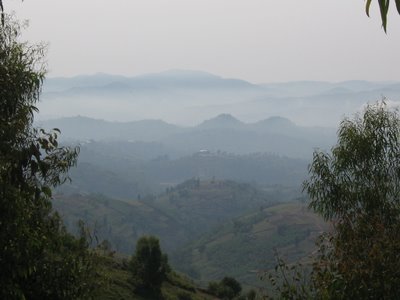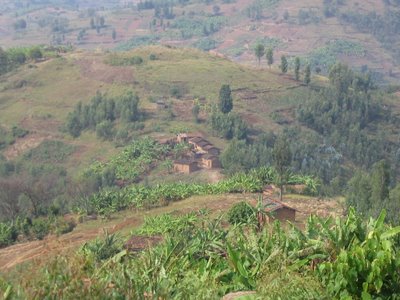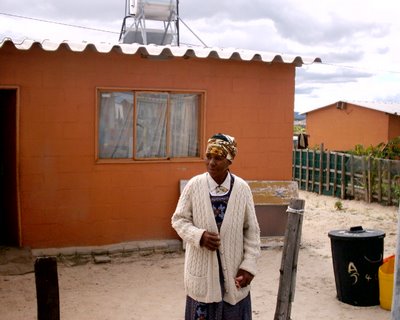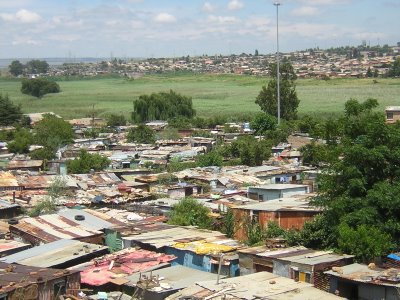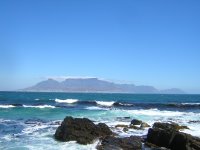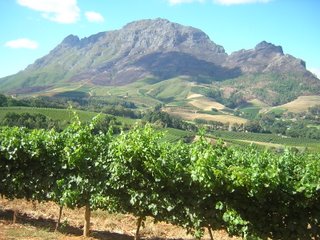 This is quite a revealing interview with President Paul Kagame by the BBC. I only wish Kagame had made a clearer case on the involvement of the international community in the Rwandan genocide, which is indeed scandalous. But this is some welcome publicity for certain issues on both sides of the argument. Click here to watch the interview (RealPlayer file).
This is quite a revealing interview with President Paul Kagame by the BBC. I only wish Kagame had made a clearer case on the involvement of the international community in the Rwandan genocide, which is indeed scandalous. But this is some welcome publicity for certain issues on both sides of the argument. Click here to watch the interview (RealPlayer file).
Friday, December 15, 2006
Paul
 This is quite a revealing interview with President Paul Kagame by the BBC. I only wish Kagame had made a clearer case on the involvement of the international community in the Rwandan genocide, which is indeed scandalous. But this is some welcome publicity for certain issues on both sides of the argument. Click here to watch the interview (RealPlayer file).
This is quite a revealing interview with President Paul Kagame by the BBC. I only wish Kagame had made a clearer case on the involvement of the international community in the Rwandan genocide, which is indeed scandalous. But this is some welcome publicity for certain issues on both sides of the argument. Click here to watch the interview (RealPlayer file).
Monday, December 11, 2006
Lake Muhazi (video)
This clip is from a 2-day visit to lake Muhazi. A beautiful place, about 70km to the North-East of Kigali.
Sunday, December 10, 2006
Privatisation in Rwanda
This will probably only be of interest to Rwanda-philes and energy sector people. But the FT published a very interesting article on the privatisation of Rwandan utilities.
Working on the development of small private sector companies in the energy sector, I am very much aware of the painfully slow privatisation process in the energy sector. My comments on this are also on the World Bank's Private Sector Development Blog:
"Privatisation has to be about more than selling off state assets. It needs to be as much about transparent regulation and stimulating competition. The telecoms sector in Rwanda is still lacking much-needed competition. As for the lack of progress in the energy sector, this sector could move ahead even whilst Electrogaz' privatisation is paralysed by its high generation costs. But for this, Rwanda would need to introduce clear regulation that opens the way for private sector investors to challenge the poor levels of delivery of Electrogaz' defacto (but no longer legal) monopoly."
Working on the development of small private sector companies in the energy sector, I am very much aware of the painfully slow privatisation process in the energy sector. My comments on this are also on the World Bank's Private Sector Development Blog:
"Privatisation has to be about more than selling off state assets. It needs to be as much about transparent regulation and stimulating competition. The telecoms sector in Rwanda is still lacking much-needed competition. As for the lack of progress in the energy sector, this sector could move ahead even whilst Electrogaz' privatisation is paralysed by its high generation costs. But for this, Rwanda would need to introduce clear regulation that opens the way for private sector investors to challenge the poor levels of delivery of Electrogaz' defacto (but no longer legal) monopoly."
Monday, October 02, 2006
Ruhengeri and surroundings (video)
This is my first experiment with moving pictures. This is a clip from the road in Northern Rwanda in and around Ruhengeri. Music is by the Congolese group Franco et le TP OK Jazz. Enjoy.
Monday, September 18, 2006
Rwanda's disappearing hills
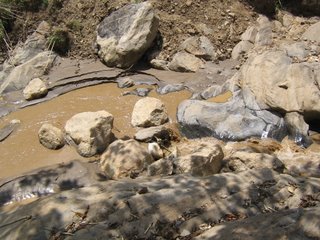

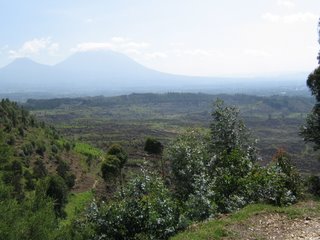
 Rwanda has a erosion problem. A big erosion problem. It is a densely populated country that lives off agriculture. The hills are gradually being washed away by rivers and rain. Terracing (which would reduce erosion) is a little-known concept here. What you see in the first picture, is a river that is full of mud and sediment being washed downstream and eventually into the Nile. The rocks, are all that will be left when the soil has been washed away.
Rwanda has a erosion problem. A big erosion problem. It is a densely populated country that lives off agriculture. The hills are gradually being washed away by rivers and rain. Terracing (which would reduce erosion) is a little-known concept here. What you see in the first picture, is a river that is full of mud and sediment being washed downstream and eventually into the Nile. The rocks, are all that will be left when the soil has been washed away.Some years ago, several provinces started planting trees to reduce soil erosion. Many of these trees were Eukalyptus. Eukalyptus grows fast. Great. But it also requires alot of water. And Rwanda has a water shortage problem. In the second picture you can see the Eukalyptus trees easily: they are the ones with very light green leaves. Eukalyptus also competes with slower-growing local tree species.
The last episode in this story is that now, Eukalyptus trees are apparently no longer planted, and there is a general ban on felling trees.
The last 2 pictures actually have nothing to do with this subject. But it is a beautiful view over the (active) volcano landscape in the North-West of Rwanda.
Tuesday, August 29, 2006
Those funny rich Muzungus
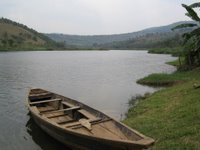 A conversation with our (Rwandan) housekeeper:
A conversation with our (Rwandan) housekeeper:- How much do soup plates cost here?
- 1000FRW per plate
- 1000FRW?? surely there must be some cheaper ones.
- No. 1000FRW for some plates which look nice and are also presentable for guests.
- But we really just need something simple and cheap.
- Well, ok, there are some that are cheaper, but they are not so nice. And not... (she giggles shyly) ... not good enough for white people.
I didn't know what to say after that.
This story is representative of the relationship between normal Rwandans and Muzungus in Rwanda. (Although I suppose having a housekeeper also contributes to this attitude.) We're rich, we eat better food, we wear new clothes (instead of second hand clothes), we drive everywhere (never walk), we shop in La Galette (the expensive German supermaket inRwanda) and even if we walk into a "normal" Rwandan shop we still pay Muzungu prices (10-20% more).
Going against the expected norms of behaviour generally creates confusion, alienation ("What are these funny Muzungus doing now?") and sometimes embarassement ("Why is this rich Muzungu in our dirty little bar?"). Luckily, attitudes are softening a little in Kigali (people don't even turn their heads anymore when I walk into my local cafe) although in parts of the countryside, one could get the impression that little has changed since the first white explorers wandered through. You can get out of your car in an apparently abandoned part of the countryside, and within 3 minutes you have a group of 5-10 Rwandan children asking you for empty water bottles (useful for transporting water in the countryside) and money.
Thursday, August 24, 2006
Monday, August 21, 2006
Les motos
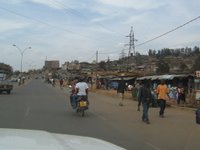 As of today, all moto-taxis (motorcycle taxis) are banned from Kigali city. Presumably this is because they are considered dangerous and apparently were used by criminals.
As of today, all moto-taxis (motorcycle taxis) are banned from Kigali city. Presumably this is because they are considered dangerous and apparently were used by criminals.With a limited bus system and few people who can afford a car, motos (with fares starting from 200Francs/30 Euro cents) were the main source of transport for many people in Kigali. Until today.
Wednesday, August 09, 2006
Development Aid Controversy
It is worth remembering that while some people may think that development aid workers are out there to save the world, the real picture is never as clear cut. Development aid is becoming increasingly controversial, and many (or even most) projects have done more harm than good. On balance however, I am still of the opinion that the development community is learning (and the project that I am working on is an example of that: a public-private partnership programme for the development of the private sector). Development assistance is simply too important in a world of rising inequalities and social problems for us to cut back on aid. But, the mentality of "all aid is always good" is one that the developed world needs to give up for good.
(for those of you interested enough, you can read a comment of mine on another blog)
(for those of you interested enough, you can read a comment of mine on another blog)
Monday, August 07, 2006
Tuesday, July 11, 2006
Saturday, July 01, 2006
One more week in Germany
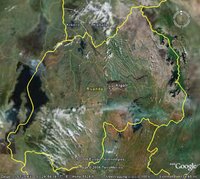 My posessions are packed into 19 boxes and I'm more than ready to finally leave Germany. I'm also looking forward to having a permanent home again in Rwanda for a while.
My posessions are packed into 19 boxes and I'm more than ready to finally leave Germany. I'm also looking forward to having a permanent home again in Rwanda for a while.My new GTZ contract officially begins today, so next week I will be at the head office near Frankfurt for a week of introductory presentations, contractual issues and meetings. Then in 8 days, I will at long last fly out to Kigali.
For those of you who still haven't figured out where Rwanda is, these maps are for you :-)
One great tragedy is that my flight is on the evening of the world cup final. That was some VERY bad planning on my part!
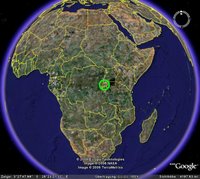
Monday, June 19, 2006
Addis Ababa
 In Addis (see photo) I had a meeting about a possible job in Rwanda. In a rather surprising turn in my life, I now have a job in Rwanda, starting on the 1st July (contract to be signed in the next weeks). It was an offer too good to let pass. I will be working on setting up village electricity grids using small-scale hydro. Now I am back in Munich, trying to sort everything out in time for my move to Kigali. Life is hectic, but I'm looking forward to the new job and new country.
In Addis (see photo) I had a meeting about a possible job in Rwanda. In a rather surprising turn in my life, I now have a job in Rwanda, starting on the 1st July (contract to be signed in the next weeks). It was an offer too good to let pass. I will be working on setting up village electricity grids using small-scale hydro. Now I am back in Munich, trying to sort everything out in time for my move to Kigali. Life is hectic, but I'm looking forward to the new job and new country.
Saturday, June 10, 2006
Go North...
As some of you may know, I am soon returning to Germany for a brief period. At the moment, little is certain about the next few months, and a lot is possible. Next week I will be in Addis Abeba for a couple of days on business. After that I will be in Munich for a short while. I'll keep you all posted...


Sunday, June 04, 2006
Adventures with petty criminals
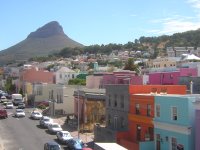 South Africans love to complain about crime. With an almost morbid fascination, they will compare shocking stories of themselves, friends or family falling victim to criminals. Admitedly, South Africa has a high crime rate. It is certainly not the most dangerous country in the world (think of the DRC, Darfur or even Rio’s favellas) but it has the crime rate that you could expect with African slums and rich European-style suburbs being within a 20 minute walk of each other.
South Africans love to complain about crime. With an almost morbid fascination, they will compare shocking stories of themselves, friends or family falling victim to criminals. Admitedly, South Africa has a high crime rate. It is certainly not the most dangerous country in the world (think of the DRC, Darfur or even Rio’s favellas) but it has the crime rate that you could expect with African slums and rich European-style suburbs being within a 20 minute walk of each other.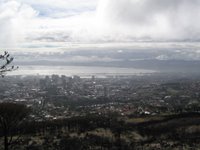 So, following in the South African tradition, here are my modest experiences with crime. As a rich white foreigner who likes to hang around central Cape Town, I seem to be targeted more than most people.
So, following in the South African tradition, here are my modest experiences with crime. As a rich white foreigner who likes to hang around central Cape Town, I seem to be targeted more than most people.My first experience with crime was simply a smashed car window. Unfortunately for the thieves, there was nothing to steal- not even a car radio- so they stole nothing. The car was a fully insured rental (not Joanna), so all the only consequence for me was that I had to spend the morning in a South African police station. I spent almost an hour queing under a sign that said “Please be patient. We are understaffed.”
 The second experience was less pleasant and more bizarre. In the middle of the day in crowded street of Cape Town, about 3 young teenagers walked up next to me and told me to give them all my money or they’d kill me. I turned around and saw three lightly-built 13 year-olds without anything even resembling a weapon. So I told them no. They continued trying to convince me until the end of the street, and then gave up.
The second experience was less pleasant and more bizarre. In the middle of the day in crowded street of Cape Town, about 3 young teenagers walked up next to me and told me to give them all my money or they’d kill me. I turned around and saw three lightly-built 13 year-olds without anything even resembling a weapon. So I told them no. They continued trying to convince me until the end of the street, and then gave up.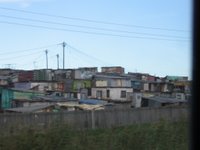 The last time was similar. Except this time I was with Daniela and they actually bothered to show me a knife (and then immediately put it in their pocket again). I must say that they weren’t very convincing thieves (also in their early teans and not very confident). They got 30 Rand (about 5 Euros) off me.
The last time was similar. Except this time I was with Daniela and they actually bothered to show me a knife (and then immediately put it in their pocket again). I must say that they weren’t very convincing thieves (also in their early teans and not very confident). They got 30 Rand (about 5 Euros) off me.Not bad for 3 months in the Western Cape. I guess I must have “stupid tourist” written all over me.
Friday, June 02, 2006
The Cape from above
Wednesday, May 31, 2006
Monday, May 29, 2006
Friday, May 26, 2006
www.agama.co.za/reeep
 This will probably only be interesting to other renewable energy people: but I have been working on a new REEEP web presence (including a news feed) at www.agama.co.za/reeep . Some of my first experiments in web page programming ;-)
This will probably only be interesting to other renewable energy people: but I have been working on a new REEEP web presence (including a news feed) at www.agama.co.za/reeep . Some of my first experiments in web page programming ;-)
Wednesday, May 24, 2006
Kuyasa
Saturday, May 20, 2006
Green Market Square
 In the centre of Cape Town there is Green Market square: a very touristic and very lively arts and crafts market. It's a great place to sit outside a Cafe and have breakfast whilst watching people go about their business.
In the centre of Cape Town there is Green Market square: a very touristic and very lively arts and crafts market. It's a great place to sit outside a Cafe and have breakfast whilst watching people go about their business.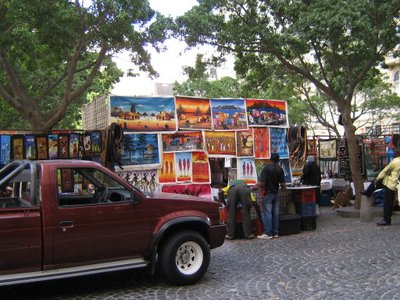 There is a guy who walks around Green Market square. The first time I saw him, I though he was a security guard. He had one of those "stun guns" for security guards which deliver an electric shock.
There is a guy who walks around Green Market square. The first time I saw him, I though he was a security guard. He had one of those "stun guns" for security guards which deliver an electric shock.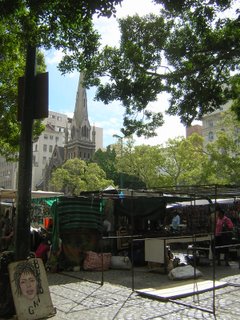 I watched him walk around the square. Then without warning he takes out his stun gun, walks up to a guy and zaps him. The guy jumps, looks a little shocked and then walks on. The guy with the stun gun then continued to walk around and occasionally walked up to someone and zapped them. He would generally chose people who were walking around trying to sell little toys or souvenirs, people begging and the occasional prostitute who wandered through.
I watched him walk around the square. Then without warning he takes out his stun gun, walks up to a guy and zaps him. The guy jumps, looks a little shocked and then walks on. The guy with the stun gun then continued to walk around and occasionally walked up to someone and zapped them. He would generally chose people who were walking around trying to sell little toys or souvenirs, people begging and the occasional prostitute who wandered through.What an idiot.
Maybe he is some kind of jobless security guard who occasionally just gets the urge to "clean up the riff-raff" at Green Market Square. I haven't seen him recently. Maybe he zapped the wrong guy...
Monday, May 15, 2006
Sunday, May 14, 2006
squattercity
I quite like this site: squattercity. I draws attention to events that would usually go unnoticed. I found the question of "slum tourism" quite interesting: http://squattercity.blogspot.com/2006/05/irving-berlin-in-delhi.html.
Thursday, May 11, 2006
Who farted?
David's bad joke about the biomethane plant reminded me that there is a biomethane plant sitting just 30 metres from my office. Only it runs off someone else's excrement. This is the inlet (sewage pipes from 2 toilets and a bunch of organic waste), the dome is where the fermentation / gasification business happens (you can't actually see it now, because it is buried underground), and the last picture is what comes out: clean natural gas. Now how cool is that. Better than trying to light a fart.


Monday, May 08, 2006
Who's the Mexican?
 I though some of you might find this amusing. This is where the last hundred visitors to my blog came from. This just goes to show, how little privacy there is on the internet. From the locations, I can usually figure out exactly who was on the blog when. There is me in Cape Town, Scott in Portland, Fabien in San Francisco, my parents in Rio, Fred in Australia and Dima in Moscow. I don't know who the heck those 2 dots in the mid-East of the States is, nor Brasilia or Mexico (?). The European part is alot more confusing. Still, I can guess most of them. The only one that puzzles me a bit is the login from Oslo. The rest are easy to guess (although many of the ones in the UK and Germany are too close to differentiate).
I though some of you might find this amusing. This is where the last hundred visitors to my blog came from. This just goes to show, how little privacy there is on the internet. From the locations, I can usually figure out exactly who was on the blog when. There is me in Cape Town, Scott in Portland, Fabien in San Francisco, my parents in Rio, Fred in Australia and Dima in Moscow. I don't know who the heck those 2 dots in the mid-East of the States is, nor Brasilia or Mexico (?). The European part is alot more confusing. Still, I can guess most of them. The only one that puzzles me a bit is the login from Oslo. The rest are easy to guess (although many of the ones in the UK and Germany are too close to differentiate).
Tuesday, April 18, 2006
Some thoughts
Not having taken any good pictures recently, I guess it is time to write a bit.
I seem to be spending alot of time worrying about the South African energy sector these days. South Africa is going through interesting times. The Western Cape is going through "load shedding"- which is basically just planned power cuts - and people are asking where South Africa's power for the next few decades of growth is going to come from. The organisation that I represent (REEEP) is getting involved in a lot of lobbying work down here - so I'm getting my share of meetings with bone-headed utility managers, ministry officials and all sorts of businessmen.
But enough work. Life is still good down here. I'm beginning to get more of a feel for the place. South Africa has a hell of a long way to go before becoming Mandela's rainbow nation, but it also isn't the crime capital of the world that many people paint it to be. The city centres are multi-cultural and multi-ethnic in a way that European cities can only dream of. The townships are far from the centres of crime and violence that is often protrayed by some South Africans and even travel guides. This is where the developed world is forced to live door-to-door with the developing world.
Europe is truly boring by comparison ;-)
Maurice
I seem to be spending alot of time worrying about the South African energy sector these days. South Africa is going through interesting times. The Western Cape is going through "load shedding"- which is basically just planned power cuts - and people are asking where South Africa's power for the next few decades of growth is going to come from. The organisation that I represent (REEEP) is getting involved in a lot of lobbying work down here - so I'm getting my share of meetings with bone-headed utility managers, ministry officials and all sorts of businessmen.
But enough work. Life is still good down here. I'm beginning to get more of a feel for the place. South Africa has a hell of a long way to go before becoming Mandela's rainbow nation, but it also isn't the crime capital of the world that many people paint it to be. The city centres are multi-cultural and multi-ethnic in a way that European cities can only dream of. The townships are far from the centres of crime and violence that is often protrayed by some South Africans and even travel guides. This is where the developed world is forced to live door-to-door with the developing world.
Europe is truly boring by comparison ;-)
Maurice
Monday, April 10, 2006
Thursday, April 06, 2006
The other South Africa
Monday, April 03, 2006
Tuesday, March 14, 2006
Day 0
Thanks for your comments people - also to Paddy (but wouldn't Raoul Duke be more appropriate than Alex Delarge?).
I'm off to the airport today. And yes, I will actually be coming back after 3 months. However, there is also a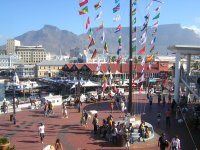 very good chance that I will return to South Africa again for longer.
very good chance that I will return to South Africa again for longer.
I know you people like pictures, so here are some more (click on them, to see them in large). Also, the link on the right hand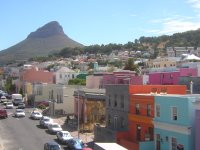 side of this page will take you to a server with a full collection of pictures from January.
side of this page will take you to a server with a full collection of pictures from January.
If anyone wants to know what I will actually be doing (expcept for getting a nice even sun tan): I will be managing the REEEP (http://www.reeep.org/) office for Southern Africa for 3 months. This office is run by AGAMA (link on the right of this page).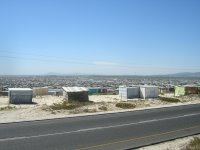
I'm off to the airport today. And yes, I will actually be coming back after 3 months. However, there is also a
 very good chance that I will return to South Africa again for longer.
very good chance that I will return to South Africa again for longer.I know you people like pictures, so here are some more (click on them, to see them in large). Also, the link on the right hand
 side of this page will take you to a server with a full collection of pictures from January.
side of this page will take you to a server with a full collection of pictures from January.If anyone wants to know what I will actually be doing (expcept for getting a nice even sun tan): I will be managing the REEEP (http://www.reeep.org/) office for Southern Africa for 3 months. This office is run by AGAMA (link on the right of this page).

Saturday, March 11, 2006
Going South...
Hi people,
This is a small experiment with this new technology. Hopefully this will allow me to keep some of you people back in Europe informed about my travels and adventures in South Africa.
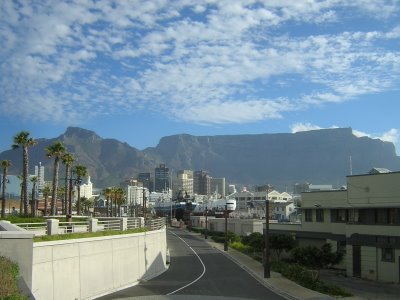
For those of you who don't know, I'm heading off to Cape Town on Tuesday to start on a 3-month assignement. It all looks very promising: beautiful country, great city, interesting work. But there is also still alot that remains to be sorted out- like accomodation.
I'll be working with a renewable energy company down there- helping with various tasks- but also with running a local office of an international renewable energy network.
 Incidentally, I am also escaping a relapse of winter in Munich (see picture), for which Cape Town is perfect (it is late summer down there). The pictures further down the page are from my visit there in January (which was clearly successful from a professional as well as a personal point of view)
Incidentally, I am also escaping a relapse of winter in Munich (see picture), for which Cape Town is perfect (it is late summer down there). The pictures further down the page are from my visit there in January (which was clearly successful from a professional as well as a personal point of view)
More news and pictures to follow soon....
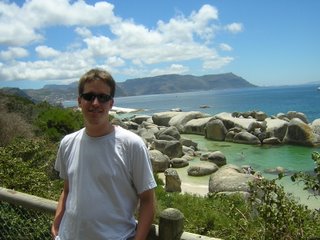
This is a small experiment with this new technology. Hopefully this will allow me to keep some of you people back in Europe informed about my travels and adventures in South Africa.

For those of you who don't know, I'm heading off to Cape Town on Tuesday to start on a 3-month assignement. It all looks very promising: beautiful country, great city, interesting work. But there is also still alot that remains to be sorted out- like accomodation.
I'll be working with a renewable energy company down there- helping with various tasks- but also with running a local office of an international renewable energy network.
 Incidentally, I am also escaping a relapse of winter in Munich (see picture), for which Cape Town is perfect (it is late summer down there). The pictures further down the page are from my visit there in January (which was clearly successful from a professional as well as a personal point of view)
Incidentally, I am also escaping a relapse of winter in Munich (see picture), for which Cape Town is perfect (it is late summer down there). The pictures further down the page are from my visit there in January (which was clearly successful from a professional as well as a personal point of view)More news and pictures to follow soon....

Subscribe to:
Comments (Atom)


